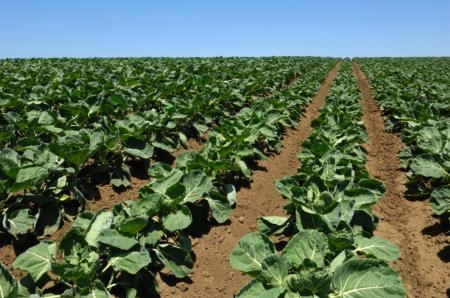Posts Tagged: Steve Koike
UC Cooperative Extension advisor receives national honor
Steven Koike, UC Cooperative Extension farm advisor in Monterey County, has received the 2013 Excellence in Extension Award by the American Phytopathological Society, reported the Salinas Californian in a lengthy profile article written by D.L. Taylor.
Koike is considered by his grower clients as a problem solver who identifies new plant diseases and controls outbreaks. He is the primary resource person for coastal plant pathology issues.
“Steve’s program provides another service to the university: it is an academic model for outstanding scholarship in the UC Cooperative Extension system,” said Maria de la Fuente, director of UCCE in Monterey County. “His vision and creativity encourage county-based academics to expand our horizons beyond historically limited roles as advisors.”
Koike’s research involves dozens of host crops and many factors that cause plant diseases, such as fungi, bacteria, viruses, as well as chemical and physical factors in the environment, the article said. For example, following the 2006 E. coli O157:H7 outbreak on California spinach, he engaged in food safety research and conducted studies on E. coli and Salmonella ecology and survival under field conditions in the Salinas Valley.

Steve Koike, left, in a broccoli raab field with a USDA plant pathologist. (Photo: USDA)
New environmental chamber to help researchers find cures for vegetable diseases
Steven Koike, UCCE advisor in Monterey County, said the chamber "will allow us to ramp up research.” The new acquisition is something like a large refrigerator in which researchers can control temperature and humidity.
“Industry in the Salinas Valley is progressive in funding research,” Koike said. “It’s not afraid to invest in solutions.”
Spinach safer five years after E. coli outbreak
Salinas Californian reporter Andy Stiny wrote a story on the 5th anniversary of the E. coli outbreak in spinach grown in San Benito County. He reported that Steve Koike, plant pathology farm advisor for Monterey County, said California's spinach industry is rebounding from the setback. Bonnie Fernandez-Fenaroli, executive director for the Center for Produce Safety at UC Davis, is quoted as saying, "A lot of research is going into all produce right now." The center has 54 produce safety projects under way. Christine Bruhn, a food marketing specialist and director of the Center for Consumer Research at UC Davis, said recent surveys show consumers are more concerned about meat products but 30 percent said they are concerned about produce safety. "We advise people to wash their sink and their hands, then wash produce in running water and dry with a clean paper towel," Bruhn told the reporter. "This reduces but does not eliminate bacteria."
UC Berkeley professor appointed to systemwide position
Sybil Lewis, The Daily Californian
UC Berkeley professor Barbara Allen-Diaz has been appointed University of California systemwide vice president for Agriculture and Natural Resources, reports the Daily Californian, the UC Berkeley student newspaper.
Scientists perplexed by verticillium wilt in lettuce
UC scientists in the Salinas Valley are trying to figure out why certain varieties of lettuce became susceptible in the 1990s to the fungus that causes verticillium wilt and how the fungus is getting into the soil.
"This is one of the more important diseases facing growers in the county," the Salinas Californian quoted UC Cooperative Extension farm advisor Steve Koike. "It has a significant impact and is increasing each year."
Strawberry crops have long suffered from the disease, but lettuce was immune. Strawberry fields are often fumigated to kill fungi, other soil-borne pests and weed seeds, however, the value of the lettuce crop doesn't justify fumigation and methyl bromide, the primary fumigant, is being phased out.
Lettuce farmers must look for other ways to manage fungus-contaminated fields, Koike told reporter Melissae Fellet. Growers can plant crops immune to the fungus, such as broccoli, cauliflower or celery, or they can plant fungus-resistant lettuce varieties.
The scientists, initially mystified about the source of the fungus, recently discovered that spinach seeds from Denmark, Holland, New Zealand and Washington state have been carrying the fungus into Salinas Valley fields, where it persists in the soil for years.
USDA awarded the researchers a $1.5 million grant to investigate how the fungus is transferred from the seeds to lettuce. UC Davis plant pathologist Krishna Subbarao, who is headquartered at the USDA research station in Salinas, is the principal investigator.

Lettuce with verticillium wilt.
UC food safety research on the national news
Last Saturday night, the CBS Evening News aired a six-minute special report on food safety. The research component for the story featured an appearance by UC Davis Cooperative Extension food safety specialist Linda Harris, in which she explained work underway to understand the potential food safety impact of irrigation practices on leafy green vegetables.
Reporter Bill Witaker noted that cutting edge research is being conducted around the country to find out how pathogens make it onto fresh produce and how to reduce the risk. He used the UC Davis Center for Produce Safety as a case in point.
Interviewed inside her lab, Harris told Whitaker the effectiveness of her work is "hard to prove, it's hard to measure, but I really think we do make a difference."
UC research isn't confined to laboratories. Three UC Cooperative Extension farm advisors in Monterey County - Steve Koike, Richard Smith and Michael Cahn - are working with campus-based researchers to determine the ability of the deadly E. coli 0157:H7 to survive in the field.
They reported in UC Delivers that they used harmless E. coli as surrogate organisms to evaluate how variations in soil moisture and environmental conditions impact the organism's survival in soil, water and on plant surfaces. In addition, experiments on E. coli source-tracking, detection technologies and field ecology are being conducted to gather information from an environment that reflects the actual farming conditions of the local agricultural industry.

UC scientists are helping protect the safety of the U.S. food supply.



